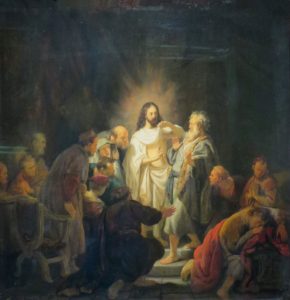Thoughts on Sunday’s Lessons for April 28, 2019
First Reading: Acts 5:27-32
Jesus has died and Christ has risen, but tension continues between Christ-followers and the Temple establishment. We’ll be hearing passages from the Acts of the Apostles as our first readings during Eastertide.

The Incredulity of St Thomas (1634). Oil painting on oak panel by Rembrandt Harmenszoon van Rijn (1606-1669). Pushkin Museum of Fine Arts, Moscow. (Click image to enlarge.)
In Sunday’s reading we learn that apostles have continued teaching, preaching and healing in Jesus’ way, and all this uproar has the authorities worried that these efforts is going to bring trouble. In the verses before these, we read that they locked Peter and the apostles in jail, but an angel set them free. Now the authorities try persuasion instead, but the apostles, recognizing a higher mission, push back: God has called them to spread the Word, and that mission trumps any human authority.
Psalm: Psalm 118:14-29
If you think parts of this Psalm seem strangely familiar, there’s a reason for that: Overlapping portions of Psalm 118 were also included in the readings for Palm Sunday and Easter Sunday. Again we sing the central covenant of the Old Testament that Jesus also taught, promising to practice justice in our lives; to serve God, our neighbor, the poor and the stranger, seeking through righteousness to enter the glory of God. Then in today’s verses we go on to address God directly, giving thanks for God’s abundant love, our lives and our salvation. “Blessed is the one who comes in the name of the Lord.”
Alternate Psalm: Psalm 150
Throughout the year, in Sunday liturgy and daily prayer, we turn to the Psalms almost every time we gather to worship. Some Psalms cry out in lamentation; some ask God’s blessing. Psalms beg forgiveness and express hope; a few even call down God’s wrath. The most joyful Psalms sing God’s praise. Psalm 150, the last Psalm, brings the book to a ringing climax as we sing out God’s glory with flutes and harp, strings and praise and plenty of loud, clanging cymbals. We sing out loud as we celebrate the resurrection during Eastertide.
Second Reading: Revelation 1:4-8
Despite the commercial success of the popular “Left Behind” stories and other interpretations of Revelation as scary prophecy for modern times, Revelation was never meant for our modern ears. In its time, the late first century, it was addressed to the Christians of seven cities in Asia Minor, now western Turkey, that faced oppression by Roman power. The letter, written in the apocalyptic genre, a sort of First Century sci-fi and fantasy, used symbolic language and colorful metaphors to reassure these early Christians that the Reign of Christ was still to come and would set them free. Christ is “the ruler of the kings of the earth,” it promises, holding up that glowing hope that Christ would eventually dominate even the Emperor of Rome.
Gospel: John 20:19-31
In John’s version of the resurrection, when Mary Magdalene alone saw the risen Christ, she ran back to tell the other disciples. It appears that they did not react immediately with celebration, though, but – as Sunday’s Gospel begins – they gathered and locked all the doors, apparently fearful that the Jewish leaders who had worked with Pilate to condemn Jesus were trying to find them. But then Jesus appears in the locked room with them, shows them his wounds and offers them peace and breathes the power of the Holy Spirit into them, and their fear turns into joy. Thomas, who wasn’t with the apostles that night, was doubtful, insisting on proof before he would believe. But Thomas, too, turns from doubt to belief when he sees Jesus.
